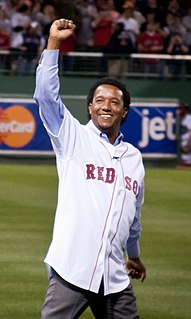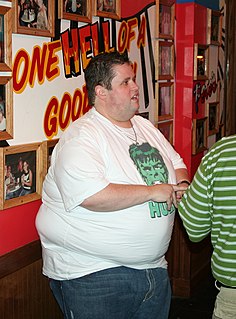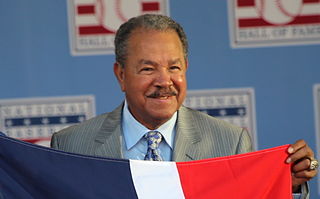Цитата Эрика Айдла
Раньше я думал, что я похож на вратаря, который похож на кэтчера в бейсболе, понимаете, что я имею в виду? Вы можете назвать игру из-за тарелки, понимаете, что я имею в виду? Вы не обязательно звезда, вы не тот, кто производит впечатление, но обычно, в конце концов, вас призывают бежать, когда это необходимо.
Связанные цитаты
Я думаю, что дидактическое искусство скучно. Я имею в виду, что мне это нравится с точки зрения некоторых исторических прецедентов, из которых я извлек уроки. Тебе это было нужно. Нам нужны были эти строительные блоки с точки зрения - вы знаете, когда я смотрю, например, на великую Барбару Крюгер, и вы думаете о положении женщины в обществе - вы знаете, она нашла способ сделать это красиво, но в то же время очень поучительно, понимаете, о чем я?
Я думаю, что большая часть производственного процесса всегда отдает себя, например, то, что я называю путями отступления, например, если эта сцена не воспроизводится, если мы понимаем, что у нас было слишком много грязных сцен подряд, и это типа, потому что у вас нет такой роскоши, когда вы находитесь в середине съемок, чтобы увидеть, как эти сцены воспроизводятся все подряд, вроде того, вы понимаете, что я имею в виду. Итак, как будто мы всегда пытаемся иметь страховые полисы, хорошо, если это не сработает, мы можем просто перейти к этому.
Я думаю, что за сознание приходится платить большую цену, зная, что все это когда-нибудь закончится и что мы смертны. Я завидую собакам. Они не знают, что стареют! И они не знают, что это ближе к концу. Я имею в виду, они никогда не думают: «Раньше я спал по 16 часов в день». Теперь, если я не получу 19, я развалина».
Что касается Deep Purple, я имею в виду, что они культовые. Их вклад не поддается количественной оценке, а что касается политики, связанной с такими вещами, как награды, вы знаете, я ничего не думаю, потому что я знаю, что они значат для меня, и я знаю, что они значат для людей, которым они нравятся. Награды имеют очень политическую основу.
Ясность не имеет значения, потому что никто не слушает и никто не знает, что вы имеете в виду, независимо от того, что вы имеете в виду и насколько ясно вы имеете в виду то, что имеете в виду. Но если у вас достаточно жизненных сил, чтобы достаточно знать, что вы имеете в виду, кто-то, а иногда и очень многие должны будут осознать, что вы знаете, что вы имеете в виду, и тогда они согласятся, что вы имеете в виду то, что знаете, то, что вы знаете, что имеете в виду. что так близко, как кто-либо может прийти к пониманию любого.
«Гриот» — французское слово, которое буквально означает «плакать». Знаешь, как городской глашатай. Вы знаете, они приходят и говорят: «Сейчас девять часов; все круто. Вы знаете, «Президент Буш — дурак». Я имею в виду, такие вещи, просто чтобы сказать вам. Но для своего рода африканская штука называется джали.
У меня есть фан-база, которая, по-видимому, похожа на вас, люди... они не то чтобы смотрят на них, но у вас есть определенные фигуры, на которые вы хотели бы больше походить, и люди действительно любят Беллу, и я тоже. но я не она... Я не думаю, что кто-то ожидает, что я буду пытаться до конца своей карьеры успокаивать публику, которой когда-то нравились "Сумерки", понимаете, о чем я?
Знаешь, в следующий раз, когда ты будешь в чем-то виновен, в следующий раз, когда тебя в чем-то обвинят, попробуй сказать: "Эй, эй, эй, я не хотел ехать на знак стоп". Или: «Я не собирался покидать бар и садиться за руль. Я действительно не собирался. Я не собирался садиться за руль после того, как выпил немного взрослых напитков». Посмотрите, работает ли это для вас. И если вы говорите, что это не одно и то же, то да, это так.
Вы знаете дни, когда вы получаете средние красные? Пол Варжак: Подлые красные. Вы имеете в виду, как блюз? Холли Голайтли: Нет. Блюз возникает из-за того, что ты толстеешь, и, может быть, дождь шел слишком долго. Тебе просто грустно, вот и все. Средние красные ужасны. Внезапно вы боитесь, и вы не знаете, чего вы боитесь. Вы когда-нибудь испытывали это чувство?
Многие игроки знают, как играть в игру, но они действительно не знают, как играть в игру, если вы понимаете, о чем я. Они могут забросить мяч в кольцо, но я вижу вещи еще до того, как они случаются. Вы знаете, как парень может сделать свою команду намного лучше? Это одна вещь, которую я понял, наблюдая за Джорданом.
В смысле, что тематическое? Как это сказать? Возвращаясь, например, к 1980 году, когда я начал писать стихи. Сам язык стал проблемой. Я бы даже подумал о шрифте как об аспекте текста, знаете, как что-то выглядит на странице. Многое из этого является продуктом очень уединенного существования, это как язык, я имею в виду, вы знаете. Много времени потратил в одиночестве на создание всего этого добра.
Я думаю, что многое из того, что я пишу, знаете, я пишу примерно так, знаете ли. Я пишу именно то, что я иногда чувствую, и трудности, через которые я прохожу. Но я всегда заканчиваю, как в припевах: «Боже, Ты хорош. Боже, Ты верен. Знаешь, я знаю, Ты понимаешь, Ты прямо здесь, рядом со мной». Все эти разные вещи. И я просто говорю очень личный опыт, через который я прошел. Я имею в виду, что это не всегда вредно.


































